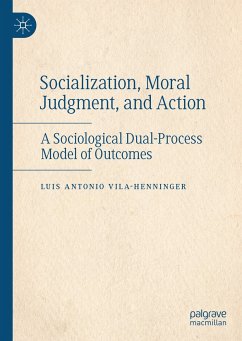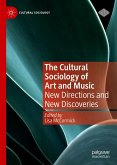How does culture affect action? This question has long been framed in terms of a means vs ends debate-in other words, do cultural ends or cultural means play a primary causal role in human behavior? However, the role of socialization has been largely overlooked in this debate. In this book, Vila-Henninger develops a model of how culture affects action called "The Sociological Dual-Process Model of Outcomes" that incorporates socialization.
This book contributes to the debate by first providing a critical overview of the literature that explains the limitations of the sociological dual-process model and subsequent scholarship-and especially work in sociology on "schemas". It then develops a sociological dual-process model of moral judgment that formally explains Type I processes, Type II processes, and the interaction between Type I and Type II processes. The book also expands sociological dual-process models to include a temporal dimension-the "Sociological Dual-Process Model of Outcomes". Finally, the book integrates a theory of socialization into the sociological dual-process model and creates empirical indicators that confirm Vila-Henninger's theorization and contribute to the literature on measures of dual-process models.
Luis Antonio Vila-Henninger is Postdoctoral Fellow for the REACTOR grant in the Political Science department at Aarhus University, Denmark, and Scientific Collaborator with UCLouvain, Belgium. Luis's research areas include the sociology of culture, sociological theory, economic sociology, political sociology, and qualitative methods. Luis's work has appeared in The British Journal of Sociology, The Journal for the Theory of Social Behaviour, Sociology Compass, Sociological Inquiry, Sociological Perspectives, The Sociological Quarterly, and The Bulletin of Sociological Methodology. His first book, Social Justification and Political Legitimacy: How Voters Rationalize Direct Democratic Economic Policy in America, was published by Palgrave Macmillan in 2020.
This book contributes to the debate by first providing a critical overview of the literature that explains the limitations of the sociological dual-process model and subsequent scholarship-and especially work in sociology on "schemas". It then develops a sociological dual-process model of moral judgment that formally explains Type I processes, Type II processes, and the interaction between Type I and Type II processes. The book also expands sociological dual-process models to include a temporal dimension-the "Sociological Dual-Process Model of Outcomes". Finally, the book integrates a theory of socialization into the sociological dual-process model and creates empirical indicators that confirm Vila-Henninger's theorization and contribute to the literature on measures of dual-process models.
Luis Antonio Vila-Henninger is Postdoctoral Fellow for the REACTOR grant in the Political Science department at Aarhus University, Denmark, and Scientific Collaborator with UCLouvain, Belgium. Luis's research areas include the sociology of culture, sociological theory, economic sociology, political sociology, and qualitative methods. Luis's work has appeared in The British Journal of Sociology, The Journal for the Theory of Social Behaviour, Sociology Compass, Sociological Inquiry, Sociological Perspectives, The Sociological Quarterly, and The Bulletin of Sociological Methodology. His first book, Social Justification and Political Legitimacy: How Voters Rationalize Direct Democratic Economic Policy in America, was published by Palgrave Macmillan in 2020.
Dieser Download kann aus rechtlichen Gründen nur mit Rechnungsadresse in A, B, BG, CY, CZ, D, DK, EW, E, FIN, F, GR, HR, H, IRL, I, LT, L, LR, M, NL, PL, P, R, S, SLO, SK ausgeliefert werden.









